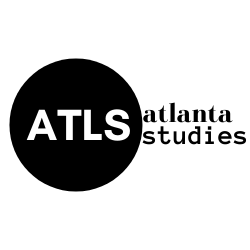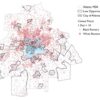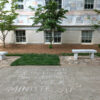Atlanta Studies is an open access, multimedia web-based journal published by the Emory Center for Digital Scholarship on behalf of the Atlanta Studies Network, which includes representatives from Emory University, Georgia State University, Georgia Institute of Technology, Clark Atlanta University, Kennesaw State University, the Atlanta History Center, and the New Georgia Encyclopedia.
We publish articles, blog posts, book reviews, and videos from the scholars, writers, artists, and activists who are writing the next chapters in our city’s story. Examining Atlanta from a wide range of perspectives, we offer thoughtful analyses of the metro region’s past and present for a public audience. We aim to be critical when addressing Atlanta’s problems and a tad boosterish when assessing its possibilities. We believe a city is no better than its scholarship, and we hope you’ll tune in and take part.
A digital publication of the Atlanta Studies Network, Atlanta Studies features innovative scholarship that takes advantage of the Internet’s capabilities to deliver audio, video, images, text, and data to facilitate new ways of organizing and presenting research. Atlanta Studies archives all of its publication materials within Emory’s Libraries and Information Technology Services (LITS) and is committed to providing a stable digital presence for content.
Articles undergo rigorous review by two members of an editorial board of experts from a wide variety of disciplines. Other materials undergo rigorous review by an editorial board member and a member of our editorial staff.
Authors retain copyright of the content they produce with limited rights granted to Atlanta Studies. Atlanta Studies is freely available to individuals and institutions. There are no charges to submit work to the journal.
ISSN: 2471-3147
Editorial Board
Folashade Alao, Atlanta Regional Commission
Folashade Alao is the program manager for the Regional Leadership Institute (RLI) at the Atlanta Regional Commission (ARC). She earned her PhD from Emory University Institute of Liberal Arts. Her research focused on black women’s artistic production, spatial understanding, and memory and history embedded in Southern physical landscapes. In her current role, she designs and leads RLI, an intensive leadership program that brings together a diverse cross sector, cross regional group of leaders to learn about the key issues, challenges, and opportunities facing the metro Atlanta region through a holistic, interdisciplinary and regional lens.
Rosalind Bentley, Atlanta Journal-Constitution
A native of Florida’s panhandle, Rosalind Bentley is a features writer at the AJC focusing on culture, arts and sometimes food. A graduate of Florida A&M University, she received her MFA in narrative non-fiction from the University of Georgia. She has covered a variety of stories over the years from the election of Nelson Mandela as South Africa’s first Black president, for which she won first place in editorial writing from the National Women’s Political Caucus, to the important role of Black women who fed the civil rights movement. A two-time James Beard Award finalist (2020), her AJC profile of U.S. Poet Laureate Natasha Trethewey was anthologized in Best American Newspaper Narratives 2012. While in Minnesota, she was a finalist for the Pulitzer Prize for a special project on race relations. Also, during her time on the tundra, she learned what’s called hot-dish in the upper Midwest is actually a version of a proper Southern casserole.
Brennan Collins, Georgia State University
Brennan Collins is the Associate Director of Writing Across the Curriculum and the Center for Excellence in Teaching and Learning at Georgia State University. The interdisciplinary nature and technology focus of these programs allows him to work with a diverse faculty in exploring inventive pedagogies. He is particularly interested in creating inter-institutional Atlanta projects and platforms to develop student critical thinking and opportunities for community engagement.
Clinton Fluker, Emory University
Clinton Fluker is the Senior Director of Culture, Community, and Partner Engagement with the Michael C. Carlos Museum and Emory Libraries. In that role, Fluker engages with Atlanta’s current and historic arts and activist communities to further cultural and scholarly activities across the Atlanta community. Prior to this, Fluker was the Rose Library curator of African American collections and the Assistant Director of Engagement and Scholarship at the Atlanta University Center’s Robert W. Woodruff Library where he supervises the Archives Research Center and the GLAM Center for Collaborative Teaching and Learning, taught in the Humanities Ph.D. program at Clark Atlanta University, and was the co-editor of The Black Speculative Arts Movement: Art + Design (2019).
Katherine Hankins, Georgia State University
Katherine Hankins is an urban geographer and an Associate Professor in the Department of Geosciences at Georgia State University. She examines urban change and how social and spatial inequalities are expressed and contested in the urban landscape, primarily at the neighborhood scale. In her work, she’s examined both the large urban development projects that have shaped neighborhood spaces and the ways in which various actors and organizations respond to such projects, whether through everyday acts, or “quiet politics,” or through sustained neighborhood activism. She has lived and worked in Atlanta since 2001.
Edward Hatfield, New Georgia Encyclopedia
Edward Hatfield is the Managing Editor of the New Georgia Encyclopedia. He has a PhD in History from Emory University and his research examines the politics of metropolitan planning in Atlanta during the latter half of the Twentieth Century.
Na’Taki Osborne Jelks, Spelman College
A Spellman and Emory Alum, Na’Taki Osborne Jelks is a nationally-recognized leader in engaging urban communities and youth of color in environmental stewardship through hands-on watershed and land restoration initiatives, environmental education, and training. In 2001, Jelks co-founded the Atlanta Earth Tomorrow® Program. In addition to her work with the National Wildlife Federation, Jelks is board chairperson of the West Atlanta Watershed Alliance, a community-based organization that recently launched the Atlanta Children’s Forest Network in partnership with the USDA Forest Service and U.S. Environmental Protection Agency to engage Atlanta youth and families in environmental education, service learning, and outdoor physical activity on over 355 acres of publicly owned, forested greenspace in Southwest Atlanta.
Jesse P. Karlsberg, Emory University
Jesse P. Karlsberg, Senior Digital Scholarship Strategist at the Emory Center for Digital Scholarship, is a scholar of vernacular American music and digital humanities publishing. Jesse is project director and editor-in-chief of the National Endowment for the Humanities–funded Sounding Spirit, a digital library and series of digital scholarly editions of songbooks of vernacular southern sacred music and project director of Readux, a platform for browsing, annotating, and publishing with digitized books.
Calinda Lee, Sources Cultural Resources Management
Educated at Spelman College, New York University and Emory University, Calinda N. Lee is the owner and principal consultant for Sources Cultural Resources Management. Lee founded the company to develop historically-resonant inclusive interpretation in exhibitions, programs, and media for cultural institutions committed to truth and innovation in their explorations of the past. Prior to founding Sources, Lee was Head of Programs and Exhibitions with the National Center for Civil and Human Rights, and a historian and VP with the Atlanta History Center, where she served as a member of the center’s leadership team.
Louise E. Shaw, David J. Sencer CDC Museum
Louise E. Shaw is the Senior Curator of the David J. Sencer CDC Museum at the Centers for Disease and Prevention. There, Shaw is responsible for curating The Story of CDC, a permanent exhibit which traces the history of the CDC from its roots in the Public Health Service to contemporary times, including CDC’s role in the COVID-19 response. She also organizes temporary history and art exhibitions that cover a range of topics relevant to CDC and to public health, such as Ebola: People + Public Health + Political Will; CDC at 75; and Art in the Time of COVID-19.
LeeAnn Lands, Kennesaw State University
LeeAnn Lands is an Associate Professor of History at Kennesaw State University. Her research focuses on housing segregation, anti-poverty movements, and spatial inequality. Her book The Culture of Property: Race, Class, and Housing Landscapes in Atlanta, 1880-1950 (University of Georgia Press, 2009) examines the relationship between whiteness and neighborhood landscapes. She is currently completing a book-length project tentatively entitled “We’ll Be Back”: Poor People’s Movements in Atlanta, 1950 to 1980.
Advisory Board
Marni Davis, Georgia State University
Kali-Ahset Amen, Johns Hopkins University
Rebecca Burns, University of Georgia
Rico Chapman, Jackson State University
Joe Crespino, Emory University
Tim Crimmins, Georgia State University
Prentiss Dantzler, University of Toronto
Kayla Edgett, University of Georgia
Joseph A. Hurley, Georgia Institute of Technology
Hank Klibanoff, Emory University
Andrea Jackson, Black Metropolis Research Consortium
Michael Leo Owens, Emory University
Elora Lee Raymond, Georgia Institute of Technology
Akira Drake Rodriguez, University of Pennsylvania
Charles Steffen, Georgia State University
Lawrence Vale, Massachusetts Institute of Technology
Stewart Varner, University of Pennsylvania
Danielle Wiggins, California Institute of Technology
Kerrie Cotten Williams, DC Public Library
Editorial Staff
Ben Miller, Executive Editor
Ra’Niqua Lee, Managing Editor
Former Staff & Board Members
FORMER EDITORIAL BOARD MEMBERS
Barbara Combs, Clark Atlanta University
Joseph A. Hurley, Georgia Institute of Technology
Anna Joo Kim, San Diego State University
Yanni Alexander Loukissas, Georgia Tech
Daniel Horowitz Garcia, StoryCorps
Marni David, Georgia State University
FORMER ADVISORY BOARD MEMBERS
Dana White, Emory University
Ben Miller, Emory University
FORMER EDITORIAL STAFF
Nikola Johnson, Co-Managing Editor (2022-2023)
Stephanie Bryan, Managing Editor (2021-2022)
Xanda Lemos Zagonel, Managing Editor (2019-2021)
Adam P. Newman, Editorial Associate (2016–2017), Assistant Managing Editor (2017-2019), Managing Editor (2019–2020)
Amy Li, Editorial Associate (2019-2020)
John A. Bernau, Editorial Associate (2018–2019)
Matt Graci, Editorial Associate (2017–2018)
Clint Fluker, Editorial Associate (2016–2018)
Jesse P. Karlsberg, Managing Editor (2016–2019)
Karen L. McCarthy, Editorial Associate (2015–2016)
Stephanie Rodgers, Editorial Associate (2014–2015)
Sarah Melton, Managing Editor (2014–2016)



